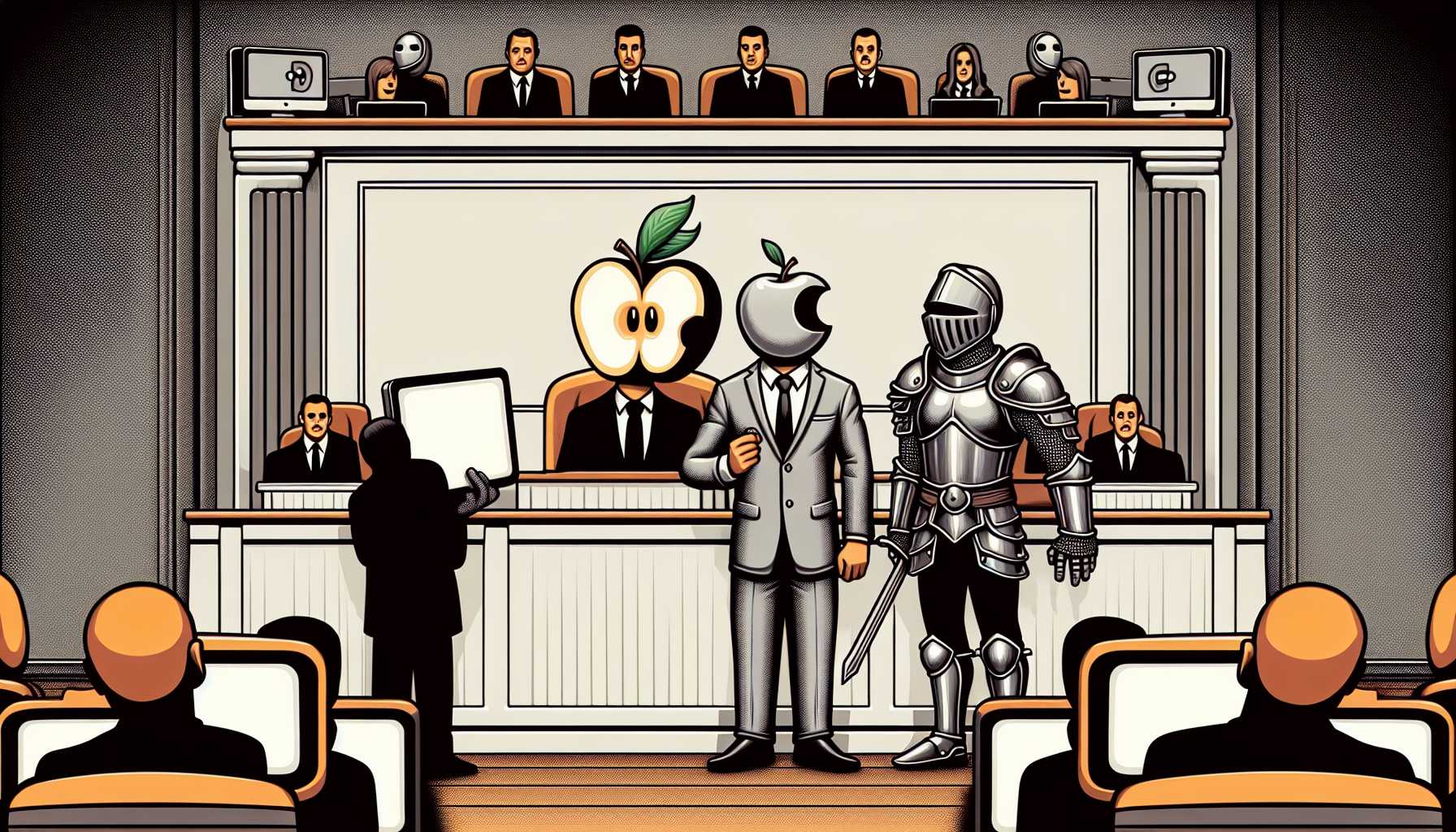# Welcome, dear readers, to another installment of the great carousel that is the tech industry! Today, we’re diving deep into a melange of tech drama, grand ambitions, and a pinch of user empowerment. As a product manager leader and tech investor, I can’t help but get a kick out of these stories. They’re not just news; they’re mini-epics of business strategy, consumer rights, and the odd twist of fate.
The Apple of Discord: Commissions, Courts, and Contempts
 Almost three years after the dust settled on the courtroom floor of the Epic v. Apple trial, the tech giant from Cupertino finds itself begrudgingly adhering to a California court’s decree. Apple must now allow app developers to include links to external payment methods, bypassing the inescapable vortex that is its in-app payment system. On paper, it seems like a win for developers, but the devil is in the details, and Apple has a knack for fine print. So what’s the catch? Apple’s new policy includes a commission of up to 27 percent for purchases made through these external links, only a smidge less than the usual 30 percent cut Apple takes within the App Store. Not exactly a cause for celebration among developers, if you ask me. And the hindrances don’t stop there. Users are now met with warning screens and redirected to external browsers, creating a less seamless experience that could deter potential transactions. It’s like defeating one payment gatekeeper just to find another one, slightly cheaper, but with more hoops to jump through. Furthermore, developers are now burthened with extra bookkeeping and auditing requirements to ensure Apple gets its due share. But here’s the kicker: some legal experts are skeptical that this new ‘Apple tax’ can stand up in court. Apple’s insistence that it can pull the same profit margin even when a third-party processes payments does walk a fine line, and Epic CEO Tim Sweeney is already vowing another legal challenge. It makes you wonder if Apple is trying to uphold the spirit of the court’s decision or just its bottom line.
Almost three years after the dust settled on the courtroom floor of the Epic v. Apple trial, the tech giant from Cupertino finds itself begrudgingly adhering to a California court’s decree. Apple must now allow app developers to include links to external payment methods, bypassing the inescapable vortex that is its in-app payment system. On paper, it seems like a win for developers, but the devil is in the details, and Apple has a knack for fine print. So what’s the catch? Apple’s new policy includes a commission of up to 27 percent for purchases made through these external links, only a smidge less than the usual 30 percent cut Apple takes within the App Store. Not exactly a cause for celebration among developers, if you ask me. And the hindrances don’t stop there. Users are now met with warning screens and redirected to external browsers, creating a less seamless experience that could deter potential transactions. It’s like defeating one payment gatekeeper just to find another one, slightly cheaper, but with more hoops to jump through. Furthermore, developers are now burthened with extra bookkeeping and auditing requirements to ensure Apple gets its due share. But here’s the kicker: some legal experts are skeptical that this new ‘Apple tax’ can stand up in court. Apple’s insistence that it can pull the same profit margin even when a third-party processes payments does walk a fine line, and Epic CEO Tim Sweeney is already vowing another legal challenge. It makes you wonder if Apple is trying to uphold the spirit of the court’s decision or just its bottom line.
Samsung’s Dance of the Do-It-Yourselfers
 On the other side of the tech pond, Samsung has decided to empower its users with the ability to perform repairs on their devices. Bucking the trend of tightly controlled ecosystems, Samsung is expanding its self-repair program to include home entertainment devices such as TVs and soundbars from 2022 and 2023. Truly a boon for those who have the knack for tinkering or simply abhor the idea of wait times at a repair shop. This move towards DIY repairs reflects a broader shift in the industry, providing users more autonomy over their devices and extending product lifespans, hopefully reducing electronic waste in the process. While the scope of repairs you can do is limited to common issues with screens, remotes, WiFi, and power sources, it’s a commendable step toward accommodating the growing ‘Right to Repair’ movement. Samsung makes an interesting foil to Apple’s more closed-off approach. By opening its doors to user repairs, the company implicitly acknowledges that tech products are not some mystery black boxes, but tools that people should have the power to maintain and extend their life.
On the other side of the tech pond, Samsung has decided to empower its users with the ability to perform repairs on their devices. Bucking the trend of tightly controlled ecosystems, Samsung is expanding its self-repair program to include home entertainment devices such as TVs and soundbars from 2022 and 2023. Truly a boon for those who have the knack for tinkering or simply abhor the idea of wait times at a repair shop. This move towards DIY repairs reflects a broader shift in the industry, providing users more autonomy over their devices and extending product lifespans, hopefully reducing electronic waste in the process. While the scope of repairs you can do is limited to common issues with screens, remotes, WiFi, and power sources, it’s a commendable step toward accommodating the growing ‘Right to Repair’ movement. Samsung makes an interesting foil to Apple’s more closed-off approach. By opening its doors to user repairs, the company implicitly acknowledges that tech products are not some mystery black boxes, but tools that people should have the power to maintain and extend their life.
Europe’s Digital Duel: Spotify vs. The Apple Behemoth
 Across the Atlantic, another battle is brewing, one that pits Apple against a robust regulatory environment and companies crying foul over anti-competitive practices. The Digital Markets Act (DMA) targets gatekeepers like Apple, which could upend how services like Spotify operate on iOS. Spotify’s dream of implementing full in-app payment functionality without Apple’s fees might soon become a reality, at least in Europe. The DMA could significantly shake up the digital landscape, enabling companies to freely allow users to upgrade subscriptions or make purchases inside apps. Apple, meanwhile, is reportedly plotting to adapt by introducing new fees and restrictions on apps downloaded outside its App Store. This play may keep the App Store revenue flowing in from another stream, even if sideloading becomes the norm. It’s an intriguing twist that brings to mind a game of corporate cat-and-mouse, where one moves in agility, and the other responds with strategy. But this is more than a corporate scuffle; it has tangible effects on developers and consumers alike. Should Apple tighten its grip, we could witness an ironic perpetuation of the very practices the DMA seeks to dismantle. It’s a shakeup that deserves a watchful eye, for it may very well dictate the future of app economics in the EU and beyond.
Across the Atlantic, another battle is brewing, one that pits Apple against a robust regulatory environment and companies crying foul over anti-competitive practices. The Digital Markets Act (DMA) targets gatekeepers like Apple, which could upend how services like Spotify operate on iOS. Spotify’s dream of implementing full in-app payment functionality without Apple’s fees might soon become a reality, at least in Europe. The DMA could significantly shake up the digital landscape, enabling companies to freely allow users to upgrade subscriptions or make purchases inside apps. Apple, meanwhile, is reportedly plotting to adapt by introducing new fees and restrictions on apps downloaded outside its App Store. This play may keep the App Store revenue flowing in from another stream, even if sideloading becomes the norm. It’s an intriguing twist that brings to mind a game of corporate cat-and-mouse, where one moves in agility, and the other responds with strategy. But this is more than a corporate scuffle; it has tangible effects on developers and consumers alike. Should Apple tighten its grip, we could witness an ironic perpetuation of the very practices the DMA seeks to dismantle. It’s a shakeup that deserves a watchful eye, for it may very well dictate the future of app economics in the EU and beyond.
Nintendo’s Clock Ticking on 3DS and Wii U Online Services
 In a poignant reminder of the relentless march of tech time, Nintendo has announced the definitive end date for online services associated with its 3DS and Wii U systems. April 8th, 2024, will see the sunset of an era for these once-state-of-the-art consoles. Vintage gamers and enthusiasts have a little over a year to prepare for this digital adieu. It’s a sobering moment that captures the impermanence of online services in the gaming world. While the physical units may endure, part of their essence, the connectivity that breathes additional life into them, is set to expire. It’s a stark reality of the tech lifecycle; today’s marvels are tomorrow’s relics.
In a poignant reminder of the relentless march of tech time, Nintendo has announced the definitive end date for online services associated with its 3DS and Wii U systems. April 8th, 2024, will see the sunset of an era for these once-state-of-the-art consoles. Vintage gamers and enthusiasts have a little over a year to prepare for this digital adieu. It’s a sobering moment that captures the impermanence of online services in the gaming world. While the physical units may endure, part of their essence, the connectivity that breathes additional life into them, is set to expire. It’s a stark reality of the tech lifecycle; today’s marvels are tomorrow’s relics.
Apple and the Vision Pro: Straddling the Past and Future
 Lastly, as we ponder the fate of consoles, Apple’s clandestine Project Titan emerges once again from the shadows. Speculation points towards Apple scaling back its ambitions from a fully self-driving electric vehicle to something more akin to a Tesla, equipped with some self-driving capabilities rather than full autonomy. Perhaps it’s a wise nod to the inherent complexities of automotive ingenuity and the fraught landscape of full automation. Or, maybe it’s a stark realization that even Apple’s reach has its limits. This shift might also be spreading its bets across more immediate launches like the Vision Pro, which is preparing for liftoff. The Vision Pro, another secretive project making waves, is poised to juggle the functions of an iPhone and a Mac. It’s yet another testament to Apple’s commitment to its Mac line, despite the product’s seemingly lessened impact on its bottom line. The duality of Apple’s focus on expansion while realigning with its heritage tells a tale of a tech titan straddling the past and future. In conclusion, the tech industry is, as ever, a fertile ground for tales of persistence, innovation, and conflict – stories that we eagerly follow and analyze, for they not only shape the digital landscape but reflect our very relationship with technology itself. Thank you for joining me in dissecting these intriguing narratives
Lastly, as we ponder the fate of consoles, Apple’s clandestine Project Titan emerges once again from the shadows. Speculation points towards Apple scaling back its ambitions from a fully self-driving electric vehicle to something more akin to a Tesla, equipped with some self-driving capabilities rather than full autonomy. Perhaps it’s a wise nod to the inherent complexities of automotive ingenuity and the fraught landscape of full automation. Or, maybe it’s a stark realization that even Apple’s reach has its limits. This shift might also be spreading its bets across more immediate launches like the Vision Pro, which is preparing for liftoff. The Vision Pro, another secretive project making waves, is poised to juggle the functions of an iPhone and a Mac. It’s yet another testament to Apple’s commitment to its Mac line, despite the product’s seemingly lessened impact on its bottom line. The duality of Apple’s focus on expansion while realigning with its heritage tells a tale of a tech titan straddling the past and future. In conclusion, the tech industry is, as ever, a fertile ground for tales of persistence, innovation, and conflict – stories that we eagerly follow and analyze, for they not only shape the digital landscape but reflect our very relationship with technology itself. Thank you for joining me in dissecting these intriguing narratives





